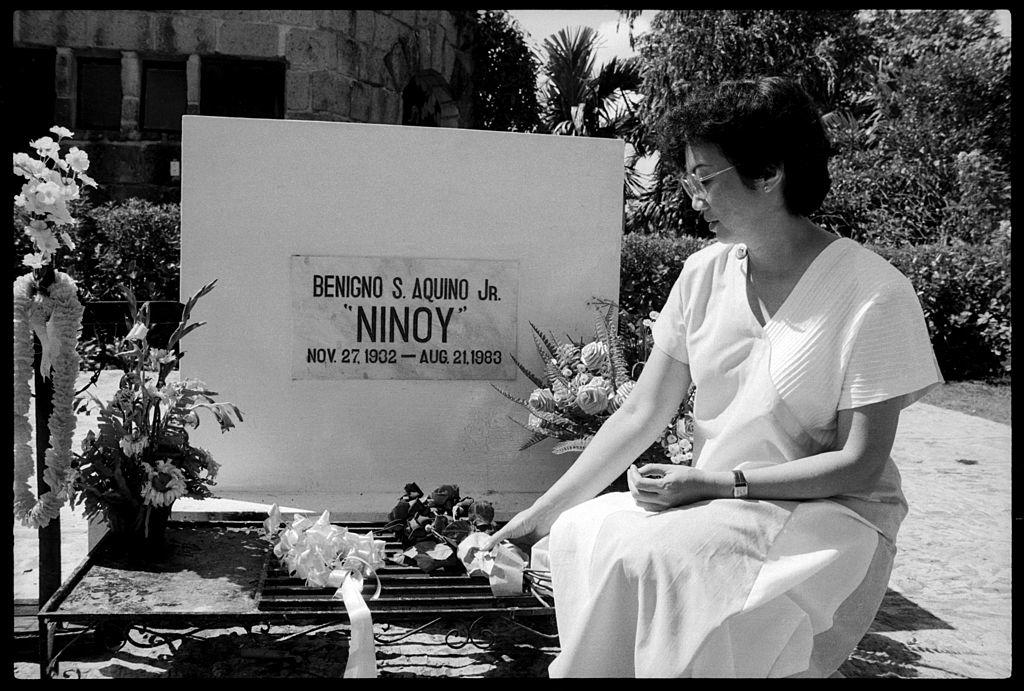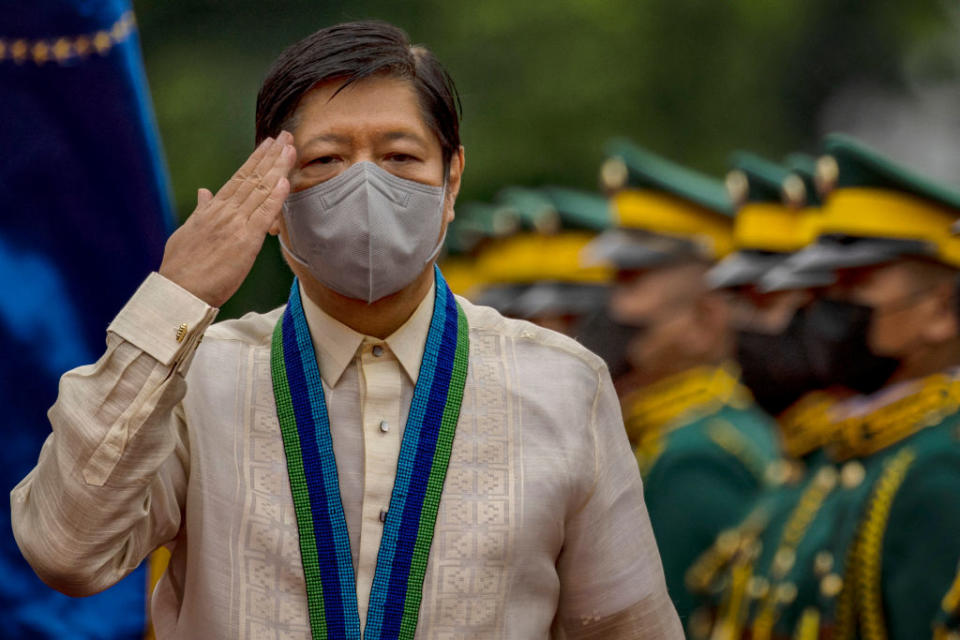On Sunday, the Philippines Celebrates the Life of a Democratic Hero. That Could Be Awkward for Its New President

- Oops!Something went wrong.Please try again later.
- Oops!Something went wrong.Please try again later.
- Oops!Something went wrong.Please try again later.
- Oops!Something went wrong.Please try again later.
- Oops!Something went wrong.Please try again later.
Corazon Aquino places flowers by the tomb of her assassinated husband Ninoy, on the outskirts of Manila, Dec. 4, 1985. Credit - Alex Bowie/Getty Images
On an August afternoon in 1983, a passenger jet carrying Philippine Senator Benigno “Ninoy” Aquino Jr. landed in Manila. The popular politician was returning from self-imposed exile in Boston to mount a courageous challenge to the dictatorship of Ferdinand Marcos Sr., whose troops escorted him off the aircraft. Then gunshots rang out—at least four. Horrified passengers looked through the windows to see the senator’s lifeless body lying on the tarmac.
Filipinos were already tired of the two-decade Marcos dictatorship, with its rights violations, martial law, rampant corruption, and tanking economy. But Aquino’s assassination, in broad daylight, was the last straw. The senator’s widow, Corazon, led a popular uprising three years later, forcing Marcos and his family into exile in Hawaii, where the dictator died in 1989.
For his sacrifice, Aquino became a posthumously venerated figure. In 1987, the place of his killing was renamed Ninoy Aquino International Airport. In 2004, the date of his assassination, Aug. 21, was declared a national holiday. But, 39 years after the senator’s slaying, the Marcos family is back in power and Aquino’s place in history is under threat.
Marcos and historical revisionism
Ferdinand “Bongbong” Marcos Jr., 64, won a landslide victory in presidential polls held in May, on the back of a campaign characterized by a cynical whitewashing of his father’s brutal legacy.
Read More: Why the World Should be Concerned by a Marcos Victory
He praises his father publicly and refuses to discuss the many unresolved issues from the era of martial law. He has also demanded that history textbooks be revised to tone down mention of his family’s unexplained wealth—even though several court rulings affirmed that some of the Marcos millions are ill-gotten.
His decision to observe or ignore the upcoming Ninoy Aquino Day—one of several “hallmarks of the revolution”—will signal the extent of his appetite for further historical revisionism, experts say.

Richard Heydarian, a lecturer of international affairs at the University of the Philippines, warns of the “toxic cocktail of massive disinformation and historical denialism” that can bring authoritarians to power and keep them there. Already, a lawmaker has proposed naming Manila airport after the dictator instead of Aquino.
Meanwhile, Maid in Malacañang, a lavish movie dramatizing the Marcos family’s last 72 hours in the presidential palace, is currently on theatrical release in the Philippines. Purporting to reveal the ”untold” story, it depicts them as heroic and tragically misunderstood figures, behaving nobly in the face of the mob at the gates. Marcos Jr.’s sister, Senator Imee Marcos, has hailed the film as “a work of truth.”
The shifting political winds have many Filipinos worried. Archivists are rushing to secure and digitize documents relating to the dictatorship. There has also been a surge in demand for books critical of the Marcos family. But pro-Marcos forces are keeping historians under relentless attack. “There’s no way to actually defend ourselves here,” says Michael “Xiao” Chua, who teaches history at the De La Salle University in Manila. “Their machinery is massive.”
Read More: The Unfinished Business Between Marcos Jr. and the Catholic Church
The future is unclear for holidays relating to the uprising. For the time being, rebuking these observances looks “distasteful,” says Chua. Marcos Jr. has not gone on record about such commemorations and since taking power has made no substantial comments on the broader topics of human rights or justice, focusing instead on the Philippine economy.
“But I wouldn’t be surprised if this is just the first-year approach of Marcos Jr.,” Heydarian says. A six-year term gives the dictator’s son plenty of time to continue rewriting history, if he chooses.
This Sunday, Filipinos will be watching him for clues.

